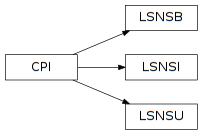5.8. pyopus.problems.karmitsa — Large scale nonsmooth test functions (Karmitsa set)¶

Large scale nonsmooth test functions (Karmitsa set) (PyOPUS subsystem name: KARMITSA)
This module is independent of PyOPUS, meaning that it can be taken as is and used as a module in some other package. It depends only on the cpi and the _karmitsa modules.
| [karmitsa] | Karmitsa N.: Test Problems for Large-Scale Nonsmooth Minimization, Technical report B.4/2007, University of Jyvaskyla, Jyvaskyla, 2007. |
- class pyopus.problems.karmitsa.LSNSU(name=None, number=None, n=2)¶
Unconstrained problems from the Karmitsa test suite. Problems 10 and 11 were added by Á. Bűrmen.
- name - problem name
- number - problem number (0-11)
- n - problem dimension
Attributes:
- name - problem name
- n - number of variables
- initial - initial values of variables
- fmin - best known minimum
This module is independent of PyOPUS, meaning that it can be taken as is and used as a module in some other package. It depends only on the cpi and the _karmitsa modules.
- cpi()¶
Returns the common problem interface.
Subgradient is not supported.
xmin is also not available.
See the CPI class for more information.
- f(x)¶
Returns the value of the function at x.
- names = ['GeneralizedMAXQ', 'GeneralizedMXHILB', 'ChainedLQ', 'ChainedCB3I', 'ChainedCB3II', 'ActiveFaces', 'GeneralizedBrown2', 'ChainedMifflin2', 'ChainedCrescentI', 'ChainedCrescentII', 'GeneralizedL1HILB', 'GeneralizedWatson']¶
List of all function names
- class pyopus.problems.karmitsa.LSNSB(name=None, number=None, n=2, feasible=1)¶
Bound constrained problems from the Karmitsa test suite.
- name - problem name
- number - problem number (0-9)
- n - problem dimension
- feasible - 0=initial point unchanged, 1=feasible, 2=strictly feasible, default=1
Attributes:
- name - problem name
- n - number of variables
- xl - lower bounds on variables
- xh - upper bounds on variables
- initial - initial values of variables
- fmin - best known minimum
This module is independent of PyOPUS, meaning that it can be taken as is and used as a module in some other package. It depends only on the cpi and the _karmitsa modules.
- cpi()¶
Returns the common problem interface.
Subgradient is not supported.
xmin is also not available.
See the CPI class for more information.
- f(x)¶
Returns the value of the function at x.
- names = ['GeneralizedMAXQ', 'GeneralizedMXHILB', 'ChainedLQ', 'ChainedCB3I', 'ChainedCB3II', 'ActiveFaces', 'GeneralizedBrown2', 'ChainedMifflin2', 'ChainedCrescentI', 'ChainedCrescentII']¶
List of all function names
- class pyopus.problems.karmitsa.LSNSI(name=None, number=None, cname=None, cnumber=None, n=10)¶
Inequality constrained problems from the Karmitsa test suite.
- name - function name
- number - function number (0-9)
- cname - constraint name
- cnumber - constraint number (0-7)
- n - problem dimension
Attributes:
- name - problem name
- fname - function name
- cname - constraint name
- n - number of variables
- m - number of constraints
- cl - lower bounds on constraint functions
- ch - upper bounds on constraint functions
- initial - initial values of variables
This module is independent of PyOPUS, meaning that it can be taken as is and used as a module in some other package. It depends only on the cpi and the _karmitsa modules.
- c(x)¶
Returns the value of the constraints at x.
- cnames = ['TridiagonalI', 'TridiagonalII', 'MAD1I', 'MAD1II', 'ModifiedMAD1I', 'ModifiedMAD1II', 'P20I', 'P20II']¶
List of all constraint names
- cpi()¶
Returns the common problem interface.
Subgradient is not supported.
xmin is also not available.
See the CPI class for more information.
- f(x)¶
Returns the value of the function at x.
- names = ['GeneralizedMAXQ', 'GeneralizedMXHILB', 'ChainedLQ', 'ChainedCB3I', 'ChainedCB3II', 'ActiveFaces', 'GeneralizedBrown2', 'ChainedMifflin2', 'ChainedCrescentI', 'ChainedCrescentII']¶
List of all function names